

Expectations of Privacy in Social Media by Stephen Henderson. University of Oklahoma College of LawMarch 8, 2012 Mississippi College Law Review, Vol. 31, 2012 Abstract: This article, which largely tracks my remarks at Mississippi College's Social Media Symposium, examines expectations of privacy in social media such as weblogs (blogs), Facebook pages, and Twitter tweets.
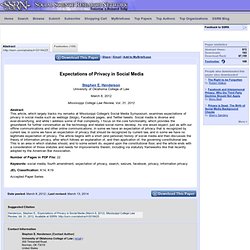
Social media is diverse and ever-diversifying, and while I address some of that complexity, I focus on the core functionality, which provides the groundwork for further conversation as the technology and related social norms develop. As one would expect, just as with our offline communications and other online communications, in some we have an expectation of privacy that is recognized by current law, in some we have an expectation of privacy that should be recognized by current law, and in some we have no legitimate expectation of privacy. Number of Pages in PDF File: 22 JEL Classification: K14, K19 Accepted Paper Series Suggested Citation. What Do Women Want? Social Media Study Shows Differing Female, Male Desires. By: Leslie Meredith Published: 03/14/2012 05:50 PM EDT on TechNewsDaily Forget fancy brands.
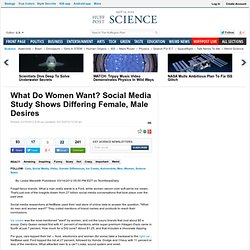
What a man really wants is a Ford, while women swoon over soft-serve ice cream. Facebook's 'dark side': study finds link to socially aggressive narcissism. Researchers have established a direct link between the number of friends you have on Facebook and the degree to which you are a "socially disruptive" narcissist, confirming the conclusions of many social media sceptics.
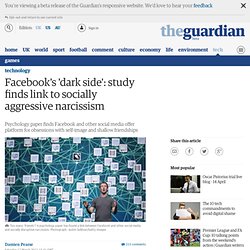
People who score highly on the Narcissistic Personality Inventory questionnaire had more friends on Facebook, tagged themselves more often and updated their newsfeeds more regularly. The research comes amid increasing evidence that young people are becoming increasingly narcissistic, and obsessed with self-image and shallow friendships. The latest study, published in the journal Personality and Individual Differences, also found that narcissists responded more aggressively to derogatory comments made about them on the social networking site's public walls and changed their profile pictures more often.
Social networks have young women competing against each other for the best body. (CNN) One day last year, Amanda Coleman decided to quit Facebook.
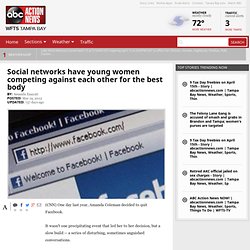
It wasn't one precipitating event that led her to her decision, but a slow build -- a series of disturbing, sometimes anguished conversations. Coleman, a college student and the president of her sorority, found herself spending a lot of time counseling young girls, many of them freshman at the university. "They would call or come in to see me for advice, crying that they were stressed out," she said. As it turned out, the insecurities that bedeviled the girls were often fueled by social networking sites. "At some point I began noticing that Facebook was being mentioned in some way in just about every conversation. " She said the girls knew they were in college to study, but they were spending hours on the computer, obsessing over photos and status updates, and comparing themselves to their friends and their friends' friends. The female of the species is more digital than the male.
Many still labour under the misconception that online is a male-dominated space.
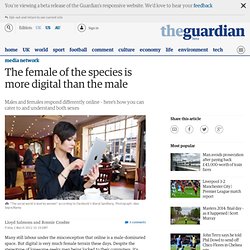
But digital is very much female terrain these days. Despite the stereotype of lonesome geeky men being locked to their computers, it's women who now rule the web. Study: Women rule social media; men tote tablets. Women unfriend more, have fewer social media regrets - Facebook, Twitter study. American men are more likely to have Facebook regrets than women while American women are more likely to unfriend than men, a new study from the Pew Research Center suggests. The study examines the habits of American social media users. It draws heavily on the experiences of Facebook users since Facebook is currently the country's dominant social media site.
The study's most interesting findings, according to the Associated Press : 15 percent of men and eight percent of women say they've posted something regrettable on social media 67 percent of women restrict access to their profiles compared with 58 percent of men People with higher education levels said they had the hardest time deciphering privacy settings. Young adults were more likely to edit their profile comments.
Pew's conclusions are based on a survey of 2,277 adults conducted in the spring of 2011. MSNBC pointed out unfriending is on the rise. Unfriending has grown to 63 percent in 2011 from 56 percent in 2009. Men Are from Google+, Women Are from Pinterest. Somewhere, Sinbad is cloistered in an isolated room, eagerly awaiting more material about how men and women are different.
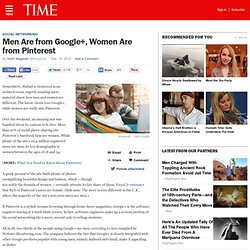
The latest: Gents love Google+, while women are really into Pinterest. The Social Media Sharing Habits Of Men And Women. Facebook May Detect Adolescent Depression Before Doctors or Parents. Facebook status updates may be useful to diagnose adolescent depression, according to psychologists involved in a new study.
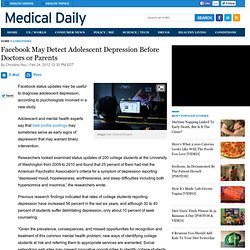
Adolescent and mental health experts say that dark profile postings may sometimes serve as early signs of depression that may warrant timely intervention. Researchers looked examined status updates of 200 college students at the University of Washington from 2009 to 2010 and found that 25 percent of them had met the American Psychiatric Association's criteria for a symptom of depression reporting “depressed mood, hopelessness, worthlessness, and sleep difficulties including both hypersomnia and insomnia,” the researchers wrote. Facebook Posts Can Offer Clues of Depression. But specialists in adolescent medicine and mental health experts say that dark postings should not be hastily dismissed because they can serve as signs of depression and an early warning system for timely intervention.
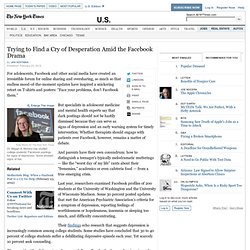
Whether therapists should engage with patients over Facebook, however, remains a matter of debate. And parents have their own conundrum: how to distinguish a teenager’s typically melodramatic mutterings — like the “worst day of my life” rants about their “frenemies,” academics or even cafeteria food — from a true emerging crisis. When a Facebook Post Is a Cry for Help. In today’s connected world, it is not uncommon for high school and college students to use Facebook as a place to pour out their feelings, sometimes in intensely personal updates.
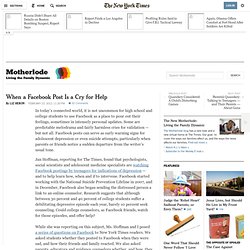
Some are predictable melodrama and fairly harmless cries for validation — but not all. Facebook posts can serve as early warning signs for adolescent depression or even suicide attempts, particularly when parents or friends notice a sudden departure from the writer’s usual tone. Jan Hoffman, reporting for The Times, found that psychologists, social scientists and adolescent medicine specialists are watching Facebook postings by teenagers for indications of depression — and to help learn how, when and if to intervene.
Facebook started working with the National Suicide Prevention Lifeline in 2007, and in December, Facebook also began sending the distressed person a link to an online counselor. Facebook takes a toll on your mental health. By Stephanie PappasLiveScience Facebook's initial public offering of stock is likely to make a lot of developers and designers of the site very wealthy.
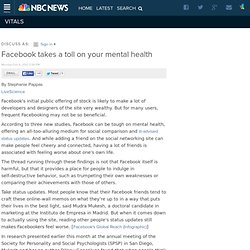
But for many users, frequent Facebooking may not be so beneficial. According to three new studies, Facebook can be tough on mental health, offering an all-too-alluring medium for social comparison and ill-advised status updates. And while adding a friend on the social networking site can make people feel cheery and connected, having a lot of friends is associated with feeling worse about one's own life. The thread running through these findings is not that Facebook itself is harmful, but that it provides a place for people to indulge in self-destructive behavior, such as trumpeting their own weaknesses or comparing their achievements with those of others. Take status updates.
Facebook Damages Relationships for People With Low Self-Esteem. Facebook: Is this any place for the not-so-self-assured to make friends? Facebook, the social networking giant that connects 845 million people to one another, may be a jolly gabfest for the self-assured. But for those who suffer from low self-esteem, it appears to be a rather nasty trap, luring such people into self-disclosures that prompt many a Facebook friend to agree with their low opinion of themselves. A new study, set to be published in the journal Psychological Science, explored the dynamics of friendship on Facebook to see what benefits or pitfalls the site might offer to a population that could use the propping up of a few new friends: those who think poorly of themselves, fear judgment by others and are prone to social isolation and depression.
Social media can give people a fear of missing out. It has been called FOMO, or the fear of missing out. Back in the day, people could just watch TV and get all of the information they needed for any given moment, but today, social media gives people many mediums to get information and find out what's going on at any time. This creates a problem for some people, as this wealth of knowing of what others are doing all the time, can be overwhelming and can make them feel like they're missing out on something. According to Dr. Travis Heath, a professor of psychology at Metropolitan State College of Denver, there isn't necessarily more going on in our lives today than before social media, we just have more ways of finding out what's going on in everyone else's. "I don't think that we have more [things going on], necessarily, that we used to have, we just think we do because everyone's tweeting about it, posting Facebook status updates," Heath said.
Millennials will benefit and suffer due to their hyperconnected lives. Overview of responses In a survey about the future of the internet, technology experts and stakeholders were fairly evenly split as to whether the younger generation’s always-on connection to people and information will turn out to be a net positive or a net negative by 2020. They said many of the young people growing up hyperconnected to each other and the mobile Web and counting on the internet as their external brain will be nimble, quick-acting multitaskers who will do well in key respects. At the same time, these experts predicted that the impact of networked living on today’s young will drive them to thirst for instant gratification, settle for quick choices, and lack patience. A number of the survey respondents argued that it is vital to reform education and emphasize digital literacy. Infographic: Generation Y and Facebook. Teens, kindness and cruelty on social network sites.
Social media use has become so pervasive in the lives of American teens that having a presence on a social network site is almost synonymous with being online. Fully 95% of all teens ages 12-17 are now online and 80% of those online teens are users of social media sites. Many log on daily to their social network pages and these have become spaces where much of the social activity of teen life is echoed and amplified—in both good and bad ways. We focused our attention in this research on social network sites because we wanted to understand the types of experiences teens are having there and how they are addressing negative behavior when they see it or experience it. As they navigate challenging social interactions online, who is influencing their sense of what it means to be a good or bad “digital citizen”?
How often do they intervene to stand up for others? In our survey, we follow teens’ experiences of online cruelty – either personally felt or observed – from incident to resolution. Teenagers 'prefer social media to TV' Adults Like Facebook More Than Teens, Pew Says. The majority of adults, 85 percent, in a new study believe that visiting social networks like Facebook are a pleasant way to spend time. The report was published today by Pew Research Center’s Internet & American Life project. Internet Study: Facebook Fatigue is Spreading. GlobalWebIndex, one of the world’s most detailed global insight studies into consumers’ online behaviour, has released the findings of its latest research which highlights both new and continuing trends in the way consumers access and use Web-based platforms. GlobalWebIndex 6 (GWI.6) analyses key changes in online behaviour, and is based on interviews with more than 122,000 individuals in 27 Internet markets. The study series kicked-off way back in July 2009, and it has since delivered six waves of research – there were three in 2011, and there will be three more following this one throughout 2012.
Social Skills Count on Facebook Too. There was one bright spot amid all the hand-wringing over Facebook and its supposedly negative effects on relationships. Psychologists thought that Facebook allows people with low self-esteem, who typically are wary of the kind of self-disclosure that fosters intimacy, feel safe enough to express themselves, thereby expanding their social networks. People with low self-esteem thought the same thing. Here, they thought, I can open up, show myself, make new friends. Well…maybe not. Why We Speak Freely on Social Networks. We message on Facebook but in-person I'm awkward and you're shy. When our Twitter conversation went from @ messages to direct messages, you seemed more reserved and I felt more open to speak my mind.
Social networking sites and our lives. Is Facebook Making Us Happier? With rendition switcher. Does Facebook Help Students Adapt to College? Recent psychological research suggests that social networking can help university students feel supported in their first few weeks at school. Investigating the possibility, Dr. Larry Magid: Facebook Isn't Addictive. A lot has been written about "Facebook addiction. " Facebook is so popular because it makes people believe they’re doing something important. Does Facebook Increase Social Support in Emerging Adults? Why most Facebook users get more than they give.
As Privacy Concerns Grow, More Social Media Users Are “Unfriending” - Lauren Goode - Social. Facebook shows how privacy is passe - latimes.com. Beyond Facebook: The Rise Of Interest-Based Social Networks. Psychologists Identify Twitter and Facebook Personality Types - Ideas Market. Twitter, Facebook, LinkedIn And The Hierarchy Of Needs [INFOGRAPHIC] 14 Trends of Social Media Culture. The Future of Sharing on Facebook, Twitter and Google+ Facebook Activity. Your Negative Status Updates Rub People the Wrong Way, Apparently. The Numbers Just Keep On Getting Bigger: Social Media And The Internet 2011 [STATISTICS] 100 more social media statistics for 2012. Your Average Facebook Post Only Reaches 12% Of Your Friends. Americans spend 100K years on Facebook each month (infographic)
STUDY: Facebook Addiction’s As Strong As Cigarettes.